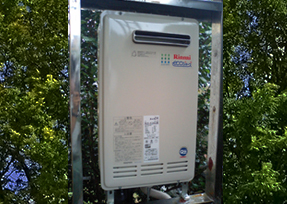Types of gas water heaters:
Atmospheric vent heaters
The most basic model gas water heater is known as the atmospheric vent gas water heater. These water heaters use the air in the room for combustion and exhaust it. Atmospheric vent water heaters have the exhaust chimney installed to a draft hood, which is located above the tank. These water heaters work on the principle of warm air currents rising and cool air settling. The warm rising air produced during combustion expels unwanted byproducts which are vented through the roof.
Power vent heaters
Another type of gas water heaters found is the power vent water heater. These water heaters resemble the atmospheric heaters. The difference lies in the exhaust system, which is made of PVC plastic instead of the metal found in atmospheric heaters. These water heaters also have a blower that helps in the removal of combustion byproducts. This blower vents the air through the roof or a sidewall. Power vent water heaters are favored due to their flexibility in installation. Due to the provision of blower-aided exhaust and PVC piping, they can be installed up to 40 feet from the wall from which combustion byproducts are being exhausted.
Direct vent water heaters
The third type of gas water heaters is the direct vent water heater. These water heaters do not use the air in the room. Instead, they are based on a gravity pull system which brings in air from the outside for combustion and exhaust. A variation to this type of water heater is the powered direct vent heater. These heaters, similar to the powered vent water heater, have a blower and PVC setup that expel exhaust fumes through an opening in a wall. This allows the heating unit to be placed at a distance of 40 feet from the actual wall opening and aids in the installation of the main heater.
Combination heaters
Today, there are even combination systems available. These systems serve a dual role of heating water and providing warm water for room heating through a radiant flow system. These systems help in increasing energy efficiency and reducing the cost of overall heating of the house.
Tips to maintain your heater:
To maintain your water heater, you should ensure that the heater’s burner area is kept free of dust and dirt. Care should be taken not to store combustible substances like paint or gasoline near the heater. Sediment buildup in the water heater can damage the water. To avoid this, the drain valve should be used once a month to drain several pails of water.










